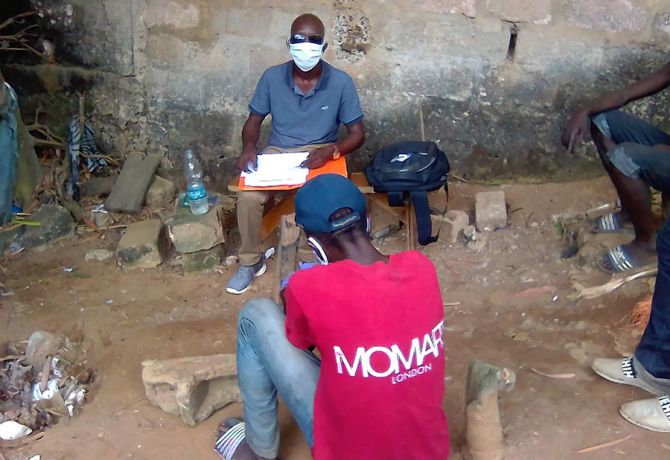

Feature Story
Harm reduction continues for people who use drugs during COVID-19 in Côte d’Ivoire
26 June 2020
26 June 2020 26 June 2020It’s 10 in the morning in Abidjan, Côte d’Ivoire.
Like every morning, Arouna Bakari (not his real name), mask on his face, washes his hands before entering a “smoking room”, as people who use drugs call the open drug-taking places in Abidjan. He checks that the hand washing sink installed in front of the smoking room is working properly. He can now start his work and distribute prevention equipment against COVID-19 to the people who gather there.
Mr Bakari works for Parole Autour de la Sante (PAS), a community-led organization made up of people who use drugs and former people who use drugs, their relatives and social scientists. It operates the first “therapeutic community”, a mixed residential programme for people who use drugs, in western Africa.
Created in Côte d’Ivoire in 2016, PAS promotes the health of people who use drugs through harm reduction and services for HIV, tuberculosis, sexually transmitted infections and hepatitis. Since October 2019, thanks to funding from OSIWA (the Open Society for West Africa), PAS has strengthened its activities, with a focus on the respect of the human rights of people who use drugs—still a highly stigmatized and discriminated against community—and their access to health services. This is why Mr Bakari, in addition to his work in the smoking rooms, also trains health workers, journalists and the security forces.
There have been harm reduction programmes in Côte d’Ivoire for some years now. Community organizations have been set up and work with the national AIDS programme, the national institutions in charge of drug policy and the international nongovernmental organization Médecins du Monde.
The COVID-19 pandemic and the restrictions on movement imposed to stop it had the initial effect of freezing PAS’ work. But very quickly the commitment to continue services regained momentum at PAS.
“People who use drugs noticed that there were no associations or nongovernmental organizations out there in the field despite the fact that people who use drugs were still grouped together in places where drugs are consumed and they still shared equipment (crack pipes, joints, cigarettes, syringes, needles), with the risk of infection with HIV, hepatitis and tuberculosis. With the addition of COVID-19, people who use drugs were now also without access to reliable information and prevention equipment to fight this new health challenge,” said Jerome Evanno, a founding member of PAS.
Therefore, PAS decided to collect and distribute COVID-19 prevention materials and to continue its harm reduction work. PAS’ workers were trained in the prevention of COVID-19 and PAS produced a video clip in nouchi, the Ivorian slang that is the language of communication in the smoking rooms, on the importance of correct hand washing.
Community research was conducted on the perceptions of people who use drugs in the context of COVID-19 in order to understand the unique fears and needs in the face of the new coronavirus. The results and recommendations of the survey have been disseminated to partners in order that they can advocate and adapt their programmes in accordance with the expectations and needs of people who use drugs.
In order to reduce the risk of outbreaks of COVID-19 in prisons, PAS also has been advocating for the release of prisoners and distributing coronavirus prevention materials to inmates at the infirmary of the Abidjan prison.



